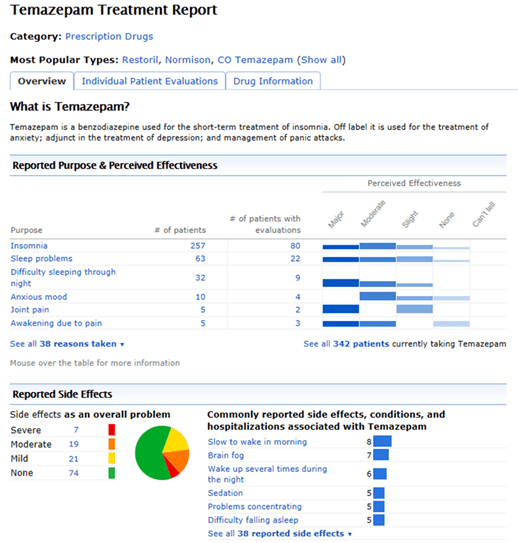I must admit that I’ve heard very little about this decision from the Federal Appeals Court for the Second Circuit of Manhattan that decided that discussing off-label uses for prescription drugs was an issue of free speech. This could change the way pharmaceutical manufacturers interact with physicians. It could change the job of the pharmaceutical rep. It could change how clinical trials are done. It could change how prescriptions are used. It could also lead to a whole new set of prior authorizations by companies that actually have to actively manage off-label usage as it becomes widespread.

On the other hand, I wonder if this door hadn’t already been opened. Have you looked at some of the peer-to-peer (P2P) healthcare websites out there or the disease based communities (e.g., PatientLikeMe or CureTogether)? Patients are already talking about what medications they are using to treat their diseases and their symptoms. Don’t you think those are leading to requests to the provider and discussions with them about off-label utilization?

And, I’m sure that Dr. Google has helped many patients identify other uses of medications. This process (to the best of my knowledge) is completely un-managed. It’s a popular enough topic that Consumer Reports talked about it earlier this year and even put together the following table on drugs commonly used off-label.
| Specific drug, type of drug | Examples of off-label use** |
| Aripiprazole (Abilify), antipsychotic | Dementia, Alzheimer’s disease |
| Tiagabine (Gabitril), antiseizure | Depression |
| Gabapentin (Neurontin), antiseizure | Nerve pain caused by diabetes, migraines, hot flashes |
| Topiramate (Topamax), antiseizure, in combination with phenteramine for weight loss | Bipolar disorder, depression, nerve pain, alcohol dependence, eating disorders |
| Risperidone (Risperdal), antipsychotic | Alzheimer’s disease, dementia, eating disorders, post-traumatic stress disorder |
| Trazodone (Desyrel), antidepressant | Insomnia, anxiety, bipolar disorder |
| Propranolol (Inderal), high blood pressure, heart disease | Stage fright |
| Sildenafil (Viagra), erectile dysfunction | To enhance sexual performance in people not diagnosed with erectile dysfunction, to improve sexual function in women taking certain antidepressants |
| Quetiapine (Seroquel), antipsychotic | Dementia, Alzheimer’s disease, obsessive-compulsive disorder, anxiety, post-traumatic stress disorder |
| SSRI antidepressants such as paroxetine (Paxil) and sertraline (Zoloft) | Premature ejaculation, hot flashes, tinnitus (ringing in the ears) |
| Prazosin (Minipress), high blood pressure | Post-traumatic stress disorder |
| Amitriptyline (Elavil), antidepressant | Fibromyalgia, migraines, eating disorders, pain after shingles infection |
| Bevacizumab (Avastin), certain types of cancer | Wet age-related macular degeneration (eye disease) |
| Statins such as atorvastatin (Lipitor), simvastatin (Zocor), high cholesterol in adults, children with an inherited cholesterol condition | Rheumatoid arthritis, to lower cholesterol in children who lack the inherited condition |
| Clonidine (Catapres), high blood pressure | Smoking cessation, hot flashes, attention deficit/hyperactivity disorder (ADHD), Tourette’s syndrome, restless legs syndrome |
* Not meant to be a comprehensive list. Many of the drugs listed here are also available as generics.
** Does not imply that use is clinically appropriate or inappropriate, or beneficial or not.
***To find out if a drug’s off-label use is supported by evidence, click on the medication name.
I would imagine that pharma is going to tip-toe through this open door not simply crash through it. They’re generally risk adverse so their discussions of off-label utilization will be fact-based (to limit exposure) even if (as we all know) statistics can lie. I would suspect (as I’ve seen on other blogs) that this will ultimately go to the Supreme Court before anyone really takes advantage of it.
I guess I’d also point to the issue that physicians have responsibility here. They prescribe off-label today. Here’s what the FDA says about this:
Good medical practice and the best interests of the patient require that physicians use legally available drugs, biologics and devices according to their best knowledge and judgement. If physicians use a product for an indication not in the approved labeling, they have the responsibility to be well informed about the product, to base its use on firm scientific rationale and on sound medical evidence, and to maintain records of the product’s use and effects. Use of a marketed product in this manner when the intent is the “practice of medicine” does not require the submission of an Investigational New Drug Application (IND), Investigational Device Exemption (IDE) or review by an Institutional Review Board (IRB). However, the institution at which the product will be used may, under its own authority, require IRB review or other institutional oversight.
One way to begin to manage this would be to require the use of diagnosis codes (Dx) on all prescriptions. This would at least great a way of tracking how the medications are being used and allow for better technology oversight across the provider, payer, pharmacy, and PBM.
In the interim, Consumer Reports suggest consumers do the following:
-
When your doctor prescribes a drug, ask if it’s an approved use. If he or she doesn’t know, ask your pharmacist.
-
Check for yourself. Go to DailyMed (dailymed.nlm.nih.gov/) and search for the drug. Then click on the tab for “Indications & Usage” to see if your condition is listed.
-
If it’s an off-label use, ask your doctor if it’s supported by well-designed trials showing significant improvement for people with your condition.
-
Ask your doctor why he or she thinks the drug will work better than approved drugs for your illness.
-
Find out if your health insurer covers payment for the off-label use. Some may require evidence of effectiveness or failure with conventional treatments, especially if the drug is expensive.

 January 8, 2013
January 8, 2013 


No comments yet... Be the first to leave a reply!